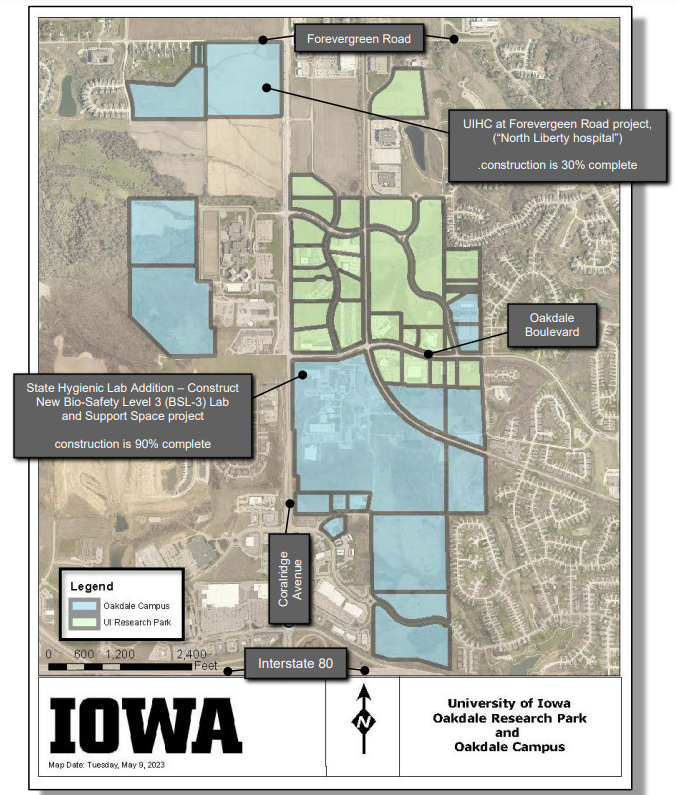
The University of Iowa is ending its master lease with the Iowa Board of Regents and the Iowa Research Park Corporation (UIRP) in favor of more appealing terms that could attract biotech and medical research firms. Right now, research companies at the Iowa Research Park can only obtain subleases. This makes companies hesitant to operate […]
Already a subscriber? Log in
Want to Read More?
Get immediate, unlimited access to all subscriber content and much more.
Learn more in our subscriber FAQ.
- Unparalleled business coverage of the Iowa City / Cedar Rapids corridor.
- Immediate access to subscriber-only content on our website.
- 26 issues per year delivered digitally, in print or both.
- Support locally owned and operated journalism.
Do you want to read and share this article without a paywall?
Click here to purchase a paywall bypass linkThe University of Iowa is ending its master lease with the Iowa Board of Regents and the Iowa Research Park Corporation (UIRP) in favor of more appealing terms that could attract biotech and medical research firms.
Right now, research companies at the Iowa Research Park can only obtain subleases. This makes companies hesitant to operate privately-owned research-based facilities on State of Iowa property, when sublease teams cannot extend past the master lease term date.
"It's hard enough to get companies interested in a ground lease, but then when it's a sub-ground lease with the State of Iowa as the underlying property owner, it just becomes very cumbersome and challenging," said David Kieft, the UI director of real estate, planning and development. "It's difficult for finance companies to put any kind of mortage or lien against the property."
According to documents presented to the board, this means "companies seek ownership opportunities" elsewhere and "developers seek company leaseback agreements." For biotech companies, they believe land ownership essential to agree to work out of the Iowa Research Park.
Mr. Kieft said the current lease was a key factor in a major biomanufacturing company opting against constructing a $650 million commercial facility in Johnson County last year.
As reported by the CBJ, Scorpion Biological Services (a subsidiary of NightHawk Biosciences) was close to bringing a 500,000-square-foot facility to the Corridor. The facility would have produced ANTHIM, an antitoxin against anthrax. Ultimately, Scorpion chose to construct its facility in Manhattan, Kansas instead.
Scorpion would've hired approximately 500 people at an average salary of $75,000 per year had they chosen the eastern Iowa location.
"Part of the feedback we received was they wanted to own the ground they wanted to build on," said Mr. Kieft. "This will give the research park to continue to ground lease if that's what works best, or sell property if that's what works best."
https://corridorbusiness.com/north-liberty-narrowly-fails-in-650m-biomanufacturing-facility-bid/
“[Scorpion] pointed to a couple very specific things, primarily around the incentive package that we were able to put in front of them,” said Austin Korns, director of business development for the Iowa City Area Development Group (ICAD), during an Iowa City Council work session last year. “There was a couple of ways that [Manhattan, Kansas] framed their incentive package that was more beneficial to them upfront, and they were interested in lowering their initial costs.”
The Kansas facility was projected to have a $1 billion impact on the state of Kansas, and the University of Iowa is hoping the new ownership agreement will ensure nine-figure bids do not come up short next time.
Other research parks, like the Iowa State University Research Park, allow developers to buy or lease land directly. In proposing these changes to the Board of Regents, UI officials are hoping to model their park off other similar research parks in the state.
The property transfer away from the underlying ownership from the Board of Regents, approved June 14, is expected to entice more regional and national businesses to operate within the research park, and by extension, grow the biosciences industry in Iowa City.
Proceeds from selling land would go into the UIRP Corporation and then redistributed from there to maintain the park, said Mr. Kieft.
The UI Research Park was established in 1989 on a now 185-acre parcel of land on the UI’s Oakdale campus in Coralville.
